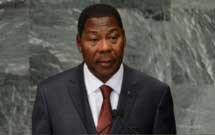 COTONOU - Benin authorities have arrested President Thomas Boni Yayi's doctor, his niece and an ex-minister over an alleged plot to poison the leader, the public prosecutor said Monday. Justin Gbenameto told journalists that prosecutors "have requested their indictment for criminal conspiracy and attempted assassination of the head of state," who is also the chairman of the African Union. Those arrested on Sunday included Moudjaidou
COTONOU - Benin authorities have arrested President Thomas Boni Yayi's doctor, his niece and an ex-minister over an alleged plot to poison the leader, the public prosecutor said Monday. Justin Gbenameto told journalists that prosecutors "have requested their indictment for criminal conspiracy and attempted assassination of the head of state," who is also the chairman of the African Union. Those arrested on Sunday included Moudjaidou
Soumanou, former minister of commerce, Yayi's personal doctor Ibrahim Mama Cisse, and Zouberath Kora-Seke, one of Yayi's nieces who worked at the presidency. "Thankfully, the plot was not successful," said Gbenameto. "Zouberath spoke about it with her sister and others, and it was those people who warned the head of state." The 60-year-old Yayi is an economist who first took office in 2006 and won re-election last year. It was alleged that the president's niece and his doctor were promised one billion CFA francs (1.5 million euros, $2 million) to replace Yayi's anti-pain medicine with poison. According to prosecutors, the ex-minister played an intermediary role. The instigator of the plot was alleged to be a Benin businessman named Patrice Talon, a former ally of the president's but who has recently been at odds with him. Talon is currently out of the country and has not been detained, but Gbenameto Benin authorities intended to issue an arrest warrant for him. "On October 17, according to various people, during the head of state's trip to Brussels, his niece who accompanied him was said to have been invited to the hotel where Patrice Talon was staying," Gbenameto said. "He had succeeded in convincing her to give the head of state products which would have been provided by the head of state's personal doctor." An aide to the president, speaking on condition of anonymity, alleged that the plot may have been linked to a decision to end a monopoly for a company supplying materials for the cotton industry as well as a major port contract. Both the port and cotton industry in the West African nation of some nine million people are major sectors of the country's economy. Yayi was initially seen as representing change in the country marked by a turbulent half-century since independence in 1960 and had pledged to root out graft, but he has been hit by a number of corruption scandals. The most prominent was an alleged Ponzi scheme reminiscent of the Bernard Madoff scandal in the United States that left scores of people in financial ruin. It also prompted calls for Yayi, who denied any wrongdoing, to be tried on accusations he helped the firm involved. But while he has been hit by scandal, Yayi has also been praised for several measures aimed at helping the country's poorest, including a vast microcredit programme.
Yayi won last year's election with 53 percent of the vote. The election had been previously postponed twice because preparations were not complete, but voting day eventually passed off calmly. His main challenger, Adrien Houngbedji, rejected the results of the election, alleging fraud and proclaiming himself the winner. The results showed Houngbedji with 36 percent. Two recent cases in Benin have drawn suspicions of political links, though there was no sign of any connection with the poisoning allegations. Last week, labour leader Pascal Todjinou was arrested and held for several days for not having vehicle insurance after a car accident. Police said they were simply following procedures, while unions and the opposition criticised the move. Meanwhile, Lionel Agbo, former spokesman for the president, has been accused of defamation and insulting the head of state. He allegedly said after leaving his post in the presidency that Yayi intended to maintain power after his two terms were up and that his entourage was corrupt.